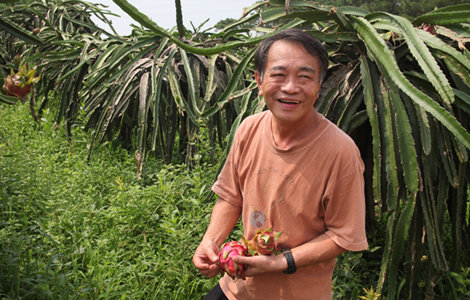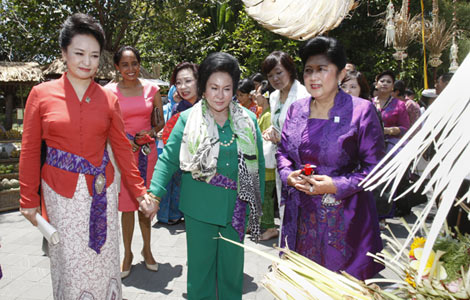A community of common destiny
Updated: 2013-10-09 07:18
By Wei Ling (China Daily)
|
||||||||
New strategic initiatives for China-ASEAN relations will promote cooperation and ensure peace and development
The year 2013 marks the 10th anniversary of the establishment of the China-ASEAN strategic partnership. Premier Li Keqiang will attend the East Asia leaders' meeting in Brunei from Oct 9 to 10, among which the highlight will be the 16th China-ASEAN leaders' meeting.
Standing at a new historical starting point, the summit between China and the Association of Southeast Asian Nations will indicate the strategic direction of China-ASEAN relations and draw a blueprint for bilateral relations. It will have far-reaching consequences for economic integration as well as political and security landscape of East Asia and the entire Asia-Pacific region.
In 2003, China-ASEAN relations were upgraded to a strategic partnership. China was the first to establish a strategic partnership with ASEAN, the first to sign the Treaty of Amity and Cooperation in Southeast Asia, and the first to start free trade area negotiations with ASEAN.
The three initiatives of China not only started a "golden decade" of China-ASEAN relations and built a favorable environment for China's development, but also provided the most important driving force for East Asian peace, prosperity and integration, transforming East Asian political culture from suspicion and confrontation to cooperation and development.
The new Chinese government initiated intensive diplomatic interaction with ASEAN members this year and proposed a series of new ideas and measures to deepen cooperation in East Asia, especially China-ASEAN cooperation.
This not only successfully defused the political crisis facing bilateral cooperation after the South China Sea disputes flared up in 2010, but also quickly carved a new situation for China's East Asian diplomacy and created new opportunities for a "diamond decade" of China-ASEAN relations in the future.
While attending the Boao Forum for Asia in April, President Xi Jinping stressed that China will further promote friendship and partnership with its neighbors, and ensure that China's development will bring even greater benefits to its neighbors. In September, Li attended the opening ceremony of the 10th China-ASEAN Expo and delivered a keynote speech, saying China's good-neighbor policy toward ASEAN is not a matter of expediency, but a long-term strategic option of China.
In September, Beijing held a series of events to commemorate the 10th anniversary of the China-ASEAN strategic partnership, and the ASEAN secretary-general and foreign ministers of all ASEAN members attended the activities. In October, in the wake of Xi's Southeast Asia tour to Indonesia and Malaysia, Li will attend the East Asia leaders' meetings and pay official visits to Brunei, Thailand and Vietnam.
Foreign Minister Wang Yi has paid five visits to Southeast Asia. Within just half a year, the new leadership has had face-to-face talks with nearly all ASEAN heads of state.
China has proposed to build a China-ASEAN community of common destiny, discuss with ASEAN members the prospect of concluding a treaty of friendship and cooperation, create an upgraded version of the China-ASEAN Free Trade Area, establish an Asia infrastructure investment bank and build China-ASEAN think-tank networks. These new strategic initiatives, at a crucial time of China-ASEAN relations, will not only greatly promote China-ASEAN mutually beneficial cooperation and common development, but once again lead the overall peace and cooperation process in East Asia.
The proposal to build a China-ASEAN community of common destiny showed China's political commitment and determination to promote good-neighbor friendship and deepen strategic mutual trust with ASEAN. It is not an expedient measure, but a long-term strategy; not an empty slogan, but has real policy implications and action plans.
To build a China-ASEAN community of destiny, China will continue prioritizing ASEAN members in the country's peripheral diplomacy, deepening China-ASEAN strategic partnership and working together with ASEAN to maintain regional peace and stability.
Meanwhile, China will firmly support ASEAN's development and growth, the construction of ASEAN community, and ASEAN's leading role in East Asian cooperation.
Among ASEAN's dialogue partners, China is a latecomer, but China-ASEAN partnership has become the most comprehensive and most substantial relationship.
The experience of China's success is to respect the ASEAN way and carry out pragmatic cooperation. Respecting the ASEAN way is to support ASEAN to play a leading and central role in regional cooperation processes and support ASEAN connectivity and integration.
The ASEAN-led model is the only proven viable way for East Asian integration, and ASEAN connectivity and integration constitute the necessary conditions for a wider range of East Asian integration.
China's rise toward a great power must have roots in East Asia, and its dream of revival will come true only in the process of sharing development fruits and making common progress with regional countries.
Building the China-ASEAN community of common destiny created a major strategic opportunity and opened up bright prospects for the common development of China and ASEAN. The community is not an exclusive alliance, but a necessary condition and an important guarantee for regional peace and prosperity.
The process of East Asian cooperation is open-ended, and the open regionalism is also an important experience that retains vitality in regional processes. It can be said that China-ASEAN relations are the most important relationship concerning the overall political, security arrangements and economic integration in East Asia.
The author is director of East Asian Studies Center at the China Foreign Affairs University.
(China Daily 10/09/2013 page8)
Most Viewed
Editor's Picks

|

|

|

|

|

|
Today's Top News
Xiaomi's Barra ready to take on Beijing
A day of cultural exchange at Pace University
ZTE, Houston Rockets shooting for global markets
Global firms facing HR challenges in Asia
Back to 1942, entered for the 86th Oscars
Obama says he'll negotiate once 'threats' end
Unprotected sex brings sharp rise in HIV/AIDS
Japan-US military drill raises tension
US Weekly

|

|













